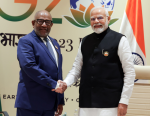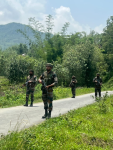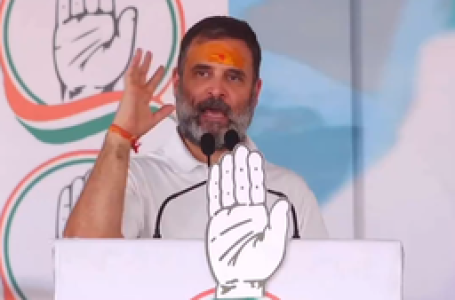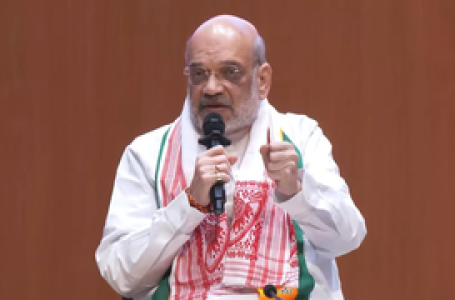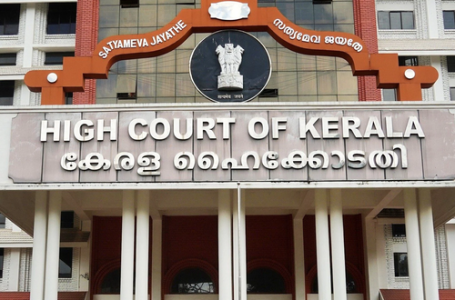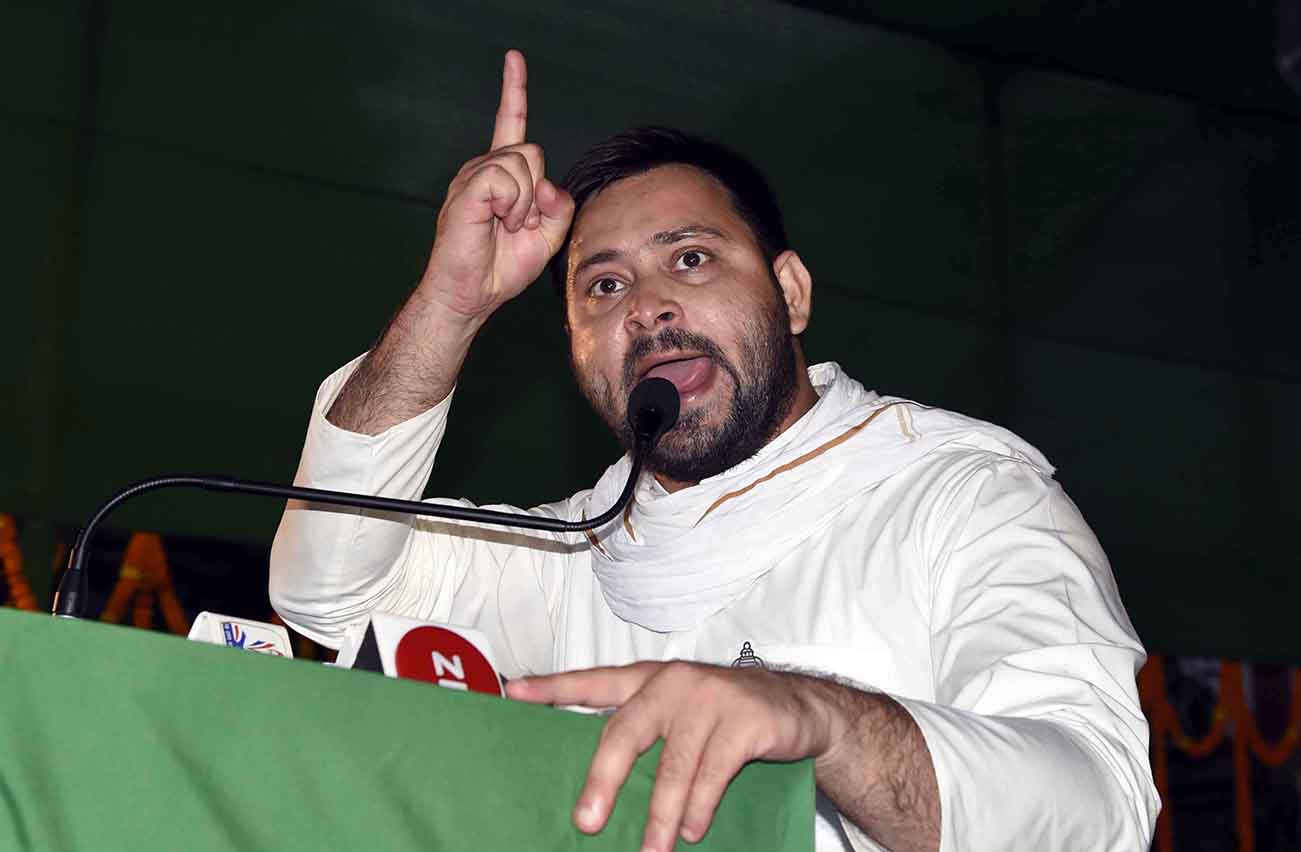
By Nilofar Suhrawardy
Nov 16, 2020
New Delhi: Though electoral verdict in the election to the 243-memberBihar Assembly has been pronounced, the real political battle in the state is not over as yet.
The situation would have been different if the Assembly elections had spelt decisive victory of any one party. While results and alliances have led to the eturn of National Democratic Alliance (NDA) to power with Nitish Kumar as Chief Minister for another term, the strong fight put up by Mahagathbandan (MGB) or the Grand Alliance of rival parties cannot be dismissed lightly by Bharatiya Janata Party (BJP) and its allies. With Rashtriya Janata Dal (RJD) led by Tejashwi Yadav having gained more seats and votes than BJP, his campaign and its impact carry a distinct message.
BJP has won 74 seats and 19.4% votes in these elections, and the RJD has secured 75 seats and 23.1% votes. Janata Dal-United (JD-U) has won 43 seats and 15.4% votes. Not surprisingly, the present scenario in Bihar is being described as one in which BJP has emerged as a big brother to JD-U in NDA alliance. Kumar no longer enjoys the earlier dominance his party had in Bihar Assembly as well as state politics. Compared to 115 seats, JD-U won in 2010 elections, 71 in 2015, this time the party has 43 seats only. In 2010, BJP won 91 seats, followed by 53 in 2015 and 74 during these polls. While BJP’s performance has improved against its gains in 2015, the same cannot be said about JD-U.
JD-U’s performance in 2010 and in 2015 was not based on its friendly relations with BJP. Rather, the case was totally different in preceding polls. Stumped by BJP in 2014 Lok Sabha polls, key regional parties of Bihar did not wish this scenario to be repeated in Assembly polls held in October-November 2015. Political luck favoured the Grand Alliance with BJP winning only 53 of the 157 seats, the party fought for. BJP secured 24.4% votes. BJP’s allies, Lok Janshakti Party (LJP), Hindustani Awam Morcha and RLSP won only five out of the 86 seats they contested. The Grand Alliance won 178 seats, with RJD securing 80 of 101 seats it contested from, JD-U 71 of 101 seats and Congress 27 of 41 seats they fought for. While RJD secured 18.4% votes, JD-U – 16.8% and Congress got 6.7% votes.
BJP may have performed well in 2015 if Grand Alliance had not been formed. It may be noted, during preceding 2010 Bihar assembly elections, JD-U, RJD and Congress had contested as rivals. Their total vote share, 22.50, 18.85 and 8.9% respectively, was more than 50%. The vote share of BJP and its allies was around 40%.
Bihar politics witnessed a major U-turn when JD-U decided to part company with Grand Alliance on July 26, 2017. Political handshake between JD-U and BJP brought the latter from opposition to power and pushed Congress and RJD to opposition. JD-U chief Kumar stayed the chief minister.
During recent elections, seat-wise and vote-wise, neither party has crossed the fifty-percent mark. There is nothing surprising about this as India has a multi-party system. In addition to numerous parties participating in elections, the strategy of fielding independent candidates and of floating small parties to contest is used by key players to split vote-banks of their rivals. Numerous candidates thus emerge as winners by small margins and without winning fifty percent votes.
At present, even though BJP hasn’t been favoured by even a quarter of voters in Bihar, the party is being viewed as the major winner and the key player in state’s politics. Nevertheless, there is another side to Bihar’s Assembly elections, which perhaps carries a strong message for Indian political strategists at all levels. Votes and seats won by BJP clearly indicate that this party’s victory does not rest on any Modi-wave. Further, the importance given by saffron brigade to Ayodhya-issue and construction of Hindu Lord Ram’s statue has had limited impact on voters.
An ally of BJP, LJP has won less than six percent votes and only one seat. It fought against JD-U in Bihar. There is a view the party adopted this strategy to diminish Kumar’s electoral gains. LJP leader, Chirag Paswan’s campaign strongly criticized Kumar’s role as a chief minister. Possibility of Paswan having been prompted to play this role by BJP cannot be ignored. BJP has time and again adopted the strategy of aligning with key regional leaders and then overshadowing them to eventually diminish their importance in their domains.
If BJP and its saffron brigade associates view Bihar results as a major victory for them, they need to revise their political calculations. They need to re-consider the electoral impact of their religious-card in comparison to that of economic issues. The nature of RJD leader Yadav’s campaign focussing on Bihar’s economic development with more employment and educational opportunities for people needs to be paid some attention. If his electoral campaign had not appealed to people, his party and its alliance would not have given a strong fight to NDA. Besides, reports of attendance at his rallies marked by a strong number of young people cannot be ignored.
Political scenario in Bihar cannot be de-linked from Covid-tension. Voters in Bihar may not have given the same importance to economic issues if they had not been struck by Covid-19. There is no denying that the vicious coronavirus has spelt economic distress for people at all levels practically all over the world. Lack of job opportunities in their state has been forcing Biharis to seek employment elsewhere for a long time. Migrant workers’ walk back following sudden announcement of lockdown earlier this year included a larger number of Biharis. As the lockdown has eased, people have once again started hunting for jobs at home and outside their states. Of these, many may not have cast their votes during these elections. However, the trauma faced by migrant workers and the crises linked with Covid-phase has apparently made people more conscious about their economic problems.
The preceding point is further proved by the limited electoral impact of Ayodhya-card. LJP leader Paswan talked of a Sita temple in Sitamarhi bigger than Ram temple in Ayodhya. Though as speculated, Paswan seems to have succeeded in reducing Kumar’s seats, his own party has performed miserably, winning just one seat out of of 137 seats the party fielded candidates from.
Besides, caste-factor and absence of religious polarization probably helped Paswan in playing a negative role against Kumar (JD-U). Interestingly, despite JD-U being a key ally of BJP at the Centre and also in state politics, Paswan went overboard in indulging in negative campaign against Kumar. Though LJP has won only one seat out, possibility of it having dented the vote-bank of Kumar in several areas cannot be ignored. JD-U candidates fought for 115 seats.
It is possible, Asaduddin Owaisi’s party (All India Majlis-e-Ittehad-ul-Muslimeen) played a spoil-sport for MGB by dividing votes of Muslims. Though Owaisi’s home state is Andhra Pradesh, he is trying to spread his party in other parts of the country. He has been strongly criticized for cutting votes of anti-BJP parties. AIMIM has succeeded in winning five seats from the 24 it fielded its candidates from. AIMIM has been blamed for poor performance displayed by Congress in certain Muslim-dominated areas. Congress has won only 19 seats out of 70 seats it fought from. Speculations are also being voiced about Congress having spoiled the show for MGB by being accorded a greater share of seats in this alliance and by not fielding right candidates in certain constituencies.
Distribution of seats among the rivals- NDA and MGB, suggests that key parties of both banked on their respective alliances yielding desired results. BJP of NDA contested from 110 seats while RJD of MGB from 144 seats. Just as JD-U fared poorly in NDA, the same can be said about Congress in MGB. Nevertheless, the stunning performance of Left Bloc in MGB cannot be ignored. With Left parties winning 16 out of 29 seats they contested from, clearly their political significance cannot be dismissed as yet.
Overall, Bihar’s electoral verdict serves as a key pointer to a few issues which cannot be ignored. The verdict has not been decided by either Modi-wave or Ayodhya-card. Covid-crisis has apparently prompted voters to give greater importance to economic issues spelled out during electoral campaign. Though caste and religious factors still hold socio-political relevance, the young voters cannot afford to ignore employment issues and development of Bihar. With Covid-19, it has dawned upon all that the vicious virus has struck them, irrespective of their caste, religion or any division.
It is possible, RJD with MGB may not have been able to give a strong fight to BJP with NDA if Covid-phase had not prompted voters to give serious consideration to their economic interests. It may be said, economic issues have never been ignored by voters. However, the new impetus accorded to the same because of Covid-crisis stands out with RJD having succeeded considerably in electorally cashing on the same. This suddenly spells a wake-up call for politicians planning subsequent elections. They need to give some importance to Bihari voters having weighed their economic concerns while casting their votes. And this probably demands analysis of Bihar elections not just on basis of political parties’ agenda but on importance accorded to the same by voters.
Within less than two years following 2015 elections, change in alliance heading the Bihar government cannot be forgotten. Nail-biting finish in recent elections has let many losers and winners dissatisfied with the results. Thus, with the stage set, political battle in Bihar at several levels is to be watched for!
—India News Stream






